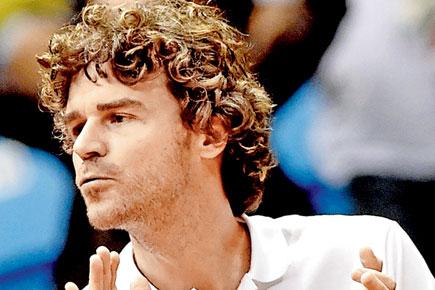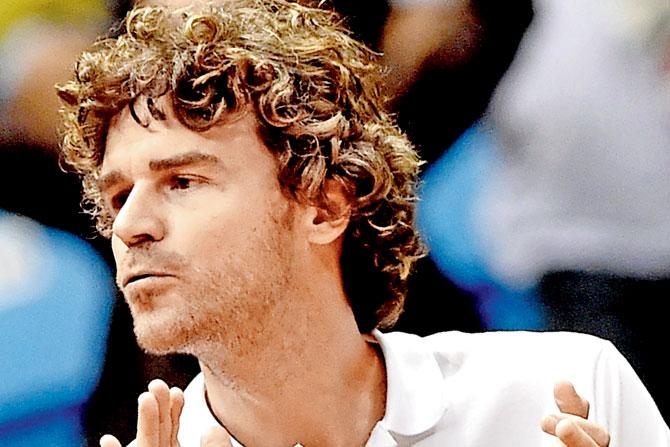As he launches his autobiography ‘Guga’ at Roland Garros, former Brazilian tennis ace reveals how he struggled to find a balance between being a ‘nice guy’ and a champion

Paris: A smile from Gustavo Kuerten is enough to brighten up a cold, cloudy day in Paris. He did a lot of that en route winning three titles (1997, 2000, 2001) at the French Open. But there was a time that the curly-haired Brazilian had to struggle to find a balance between being the ‘nice guy’ and still be a champion.
ADVERTISEMENT

Former Brazilian tennis ace Gustavo Kuerten. Pic/Getty Images
“My mother, she’s a social assistant. From the beginning, it was normal (for me) to help other people. Then suddenly I have to play and I have to beat another person. It was very hard for me at the beginning to watch someone, my friend, going out of the court crying,” said the 38-year-old Kuerten, who launched his book ‘Guga’ at Roland Garros on Saturday.
“And then I lose the match and then he was laughing; I was crying. I said, ‘No, that’s not fun, too.’ So how I have to improve and what I have to learn to be efficient as a tennis player and to become a champion?”
Paris mastered
The affable Kuerten though found a way to break into the Grand Slam champions’ circle in 1997, when he beat three former champions Sergei Bruguera, Thomas Muster and Yevgeny Kafelnikov to emerge the surprise winner in Paris. “Against Muster, I was losing 0-3 in the fifth set,” recalled Kuerten, who hasn’t been able to pick up a tennis racquet for a few years because of his hip injury. “I was complaining a lot. I couldn’t run anymore. Muster was killing me. I was thinking, ‘No, I’m done, I’m done.’ And people start to cheer me on for the first time. ‘Allez (come on), Guga; Allez, Guga.’ And things changed. I still get very emotional when I think about this because I connect it to another level that I didn’t know existed.”
Mum’s the word
Kuerten, who is now actively involved in his foundation and tennis school, though said that the book had given him another chance to reconnect with his past, with his days growing up in the southern Brazilian town of Florianopolis. His father died of a heart attack when he was eight, and his mother was forced to bring up three boys on her own. One of his bothers was differently abled, and passed away in 2007. “My brother stopped playing tennis (when he was) 15 or 16 years old to let me try, because we did not have money for both of us,” he recalled. “So, he stepped out for me to have a better chance. (At) Another stage, we had to sell the car and the piano. My mother had some jewellery. She was able to sell our house to give us our chance.
“I had this amazing power inside — the Guga that arrived from a kid and was watching this brave mother raising three sons without a husband. And seeing my handicapped brother, of being with no legs and but happy of just being able to hand a spoon or a fork, you know, simple things.”
A smile was enough to get them through the troubles. Even now, when he is the most famous sportsman outside of football in Brazil, Guga hasn’t forgotten how that one little thing somehow makes the world a better place.
 Subscribe today by clicking the link and stay updated with the latest news!" Click here!
Subscribe today by clicking the link and stay updated with the latest news!" Click here!







